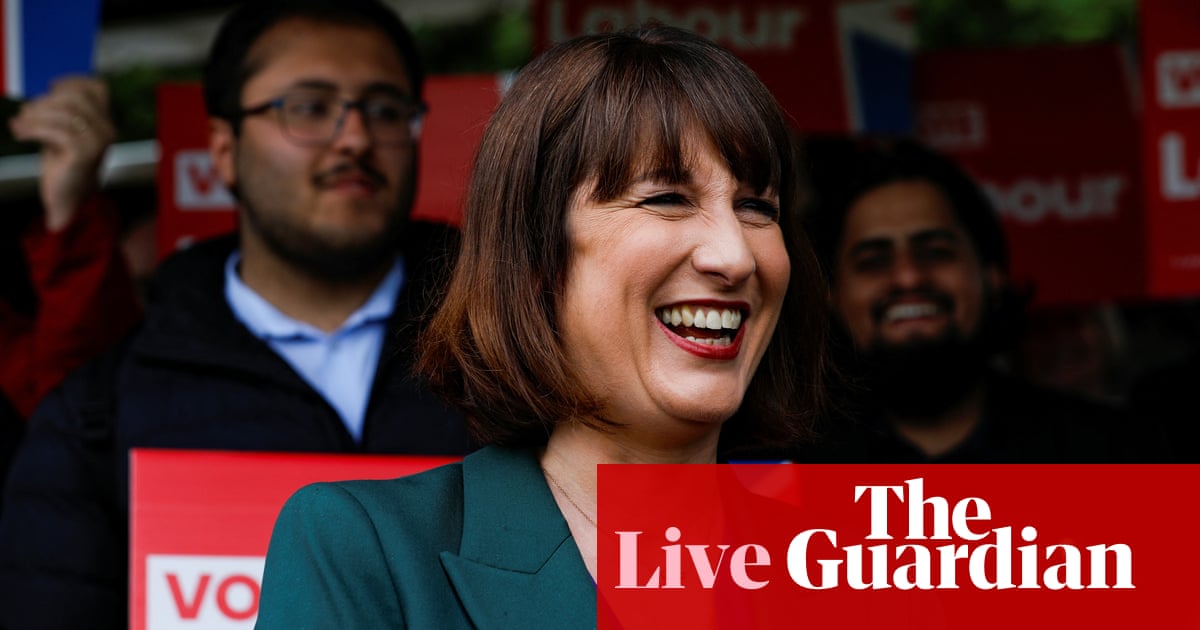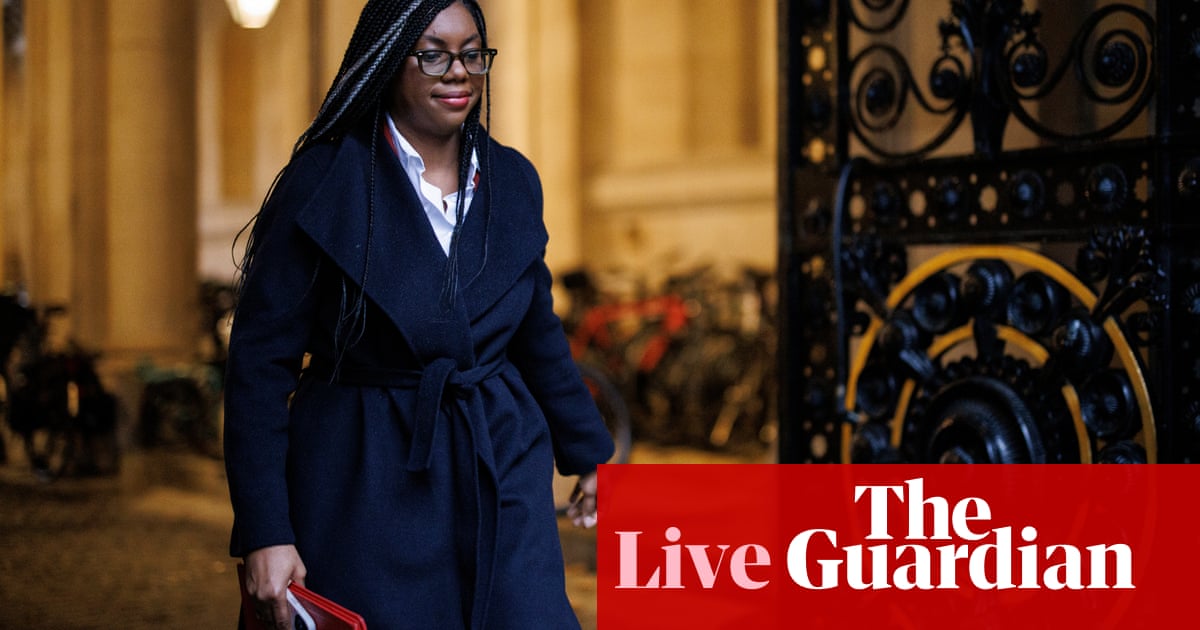
Mel Stride appointed shadow chancellor, and Priti Patel shadow foreign secretary
Mel Stride, the former work and pensions secretary, has been made shadow chancellor, the BBC is reporting.
And Priti Patel, the former home secretary, is shadow foreign secretary.
This suggests Kemi Badenoch is serious when she says she wants to unite the party. Stride is a senior figure on the left of the party, and Patel is a prominent rightwinger.
Stride and Patel were both also candidates in this year’s leadership contest.
Patel does have an interest in foreign policy. When she was international development secretary, she was sacked by Theresa May for in effect operating as a freelance foreign secretary – holding meetings with ministers in Israel without Downing Street’s approval.
Yesterday Benjamin Netanyahu, the Israeli PM, posted a message on social media congratulating Badenoch on her election victory.
Early evening summary
Kemi Badenoch has appointed Mel Stride shadow chancellor and Priti Patel shadow foreign secretary as she began to put together a Conservative frontbench team billed as uniting the party. And Robert Jenrick is becoming shadow justice secretary, Steven Swinford from the Times reports. He says:
Robert Jenrick has accepted the role of shadow justice secretary in Kemi Badenoch’s new shadow cabinet
Badenoch offered him the role after a bitterly fought leadership contest
An ally of Jenrick said: ‘Rob thinks the party needs to come together and take the fight to Labour. Unity could not be more important. He’s eager to expose Labour’s dreadful record on law and order’
University tuition fees in England are to go up next autumn for the first time in eight years, the government has said. The Conservatives have described this as a broken promised. Laura Trott, the new shadow education secretary, said:
With Keir Starmer elected to Labour leadership on a pledge to scrap tuition fees, no mention of the rise in the manifesto, and the education secretary saying in just July this year Labour had no plans to raise fees, students can be forgiven for feeling betrayed. This is another broken Labour promise to add to the long list.
The government argument that just one-third of farmers will be affected by the new inheritance tax rules is in direct conflict with data produced by the its own environment department, the NFU has pointed out.
Keir Starmer has said people smuggling should be seen as a global security threat similar to terrorism. (See 11.36am.)
Mel Stride, the new shadow chancellor, is on record as saying that he thinks parental benefits are too generous. Labour sources have been flagging up an article that Stride wrote for ConservativeHome in 2012, when he was a backbencher, saying maternity and paternity leave rights meant it was “not uncommon for an employee to take multiple breaks from work in relatively close proximity and for up to a year on each occasion”. This was unfair on employers, he argued. He went on:
The politics around this issue are tricky, with worldwide experience showing that changes in this area of employment law tend to ratchet in one direction alone – towards greater generosity to employees …
There have though been some notable examples of countries rowing back in this area in recent years, including Germany. If we want to provide a massive shot in the arm for British business and entrepreneurship I would hope that we could seriously consider following their example with at least a close look at relaxations in protected-employment
legislation for smaller businesses.
Kemi Badenoch, the new Tory leader, would almost certainly agree, based on what she said about maternity pay and business regulations during Tory conference.
The Russell Group, which represents leading, research-focused universities, has in a statement described the rise in tuition fees as “a welcome sign that government is engaging seriously with the financial difficulties facing universities and students”.
Minister hits back at Jeremy Clarkson as he defends inheritance tax extension to cover farms
Amazon prime star and Sunday Times columnist Jeremy Clarkson has been full throated in his opposition to Labour’s changes to agricultural property relief which will mean farms worth more than £1m will have to pay inheritance tax.
He has accused Keir Starmer of ‘shafting’ farmers. Clarkson previously admitted a perk of buying his farm, now famous on the show Clarkson’s Farm, was that he could avoid inheritance tax.
But Daniel Zeichner, the farming minister, hit back at Clarkson during the urgent question earlier. (See 3.48pm.) He said:
Not only do those people [critics of the policy] seem to relish finding ways of creatively running their accounts, some of them of course take money to write columns about it as well.
Many farmers have expressed genuine concerns about the changes, arguing the threshold has been set too low as people buying up farmland has artificially inflated the price, when the amount of money that can be made from farming it is very low. This means family farms which have been in the family for generations have rocketed in value, while their income has gone down, and now they are worried about being stung with a large tax bill when they pass it on to their families.
Clarkson wrote in his column in the Sunday Times this Sunday:
I was overcome with something not far removed from fury. Because, if the word on the rural grapevine about a farmer’s suicide is accurate, their policy, born of bitterness and envy, may already have tipped one man over the edge. And there they were grinning.
In the past five years agricultural land has become the must-have accessory for people in suits. And because investment bankers tend to be quite rich, the prices have gone berserk.
Round where I live, people have been paying £30,000 an acre. That means a 500-acre farm now goes for £15m. And that doesn’t include the house. Or the barns. Or the equipment. That’s just the price of the land.
But the University and College Union (UCU), which represents university staff, has criticised the tuition fees increase. Its general secretary, Jo Grady said:
Taking more money from debt ridden students and handing it to overpaid, underperforming vice-chancellors is ill-conceived and won’t come close to addressing the sector’s core issues.
As Keir Starmer himself said last year, the current fees system doesn’t work for students and doesn’t work for universities.
The model is broken; it has saddled students with decades of debt, turned universities from sites of learning into corporations obsessed with generating revenue, and continually degraded staff pay and working conditions.
Labour accepts the issues facing higher education are systemic yet has only applied a sticking plaster. Its principles are vague and could be exploited by vice-chancellors, while higher fees mean even more graduates will fail to pay back their loans, ultimately costing the exchequer.
The chancellor says ‘invest, invest, invest’: it is time to do that in higher education, especially if Labour is serious about delivering a decade of national renewal.
Universities UK, which represents the universities sector, has welcomed the rise in tuition fees. Its chief executive, Vivienne Stern said:
A decade-long freeze in England has seen inflation erode the real value of student fees and maintenance loans by around a third, which is completely unsustainable for both students and universities.
Keeping pace with inflation stops the value of fees going down year after year.
Importantly, this change will not see students paying more to study upfront; repayments are linked to earnings above a £25,000 threshold. The increase in maintenance loans is also very welcome and important.
Here is the Department for Education’s paper with details about the tuition fee increase.
Here is a DfE paper about the new arrangments for loans for living costs.
And here is a DfE paper about fees and loans for foundation years.
Phillipson accuses Tories of "faux outrage" over tuition fees increase, after Laura Trott calls it broken promise
Laura Trott, the shadow education secretary, said today’s announcement showed that the government was declaring war on students, just as it declared war on the private sector, on business and on farmers.
She said that Keir Starmer promised to get rid of tuition fees when he was standing for the Labour leadership.
And Phillipson herself said at the time of the king’s speech that she had no plans to raise tuition fees, Trott said. She said this was another example of broken promises.
In response, Phillipson accused Trott of “faux outrage”. And she said Trott had not said whether the Tories were opposing the increase or supporting it.
Phillipson also says she wants to see universities do more to contribute to local economies, and to promote social mobility. She says they should be helping more disadvantaged students to go university.
Phillipson says student tuition fee cap in England rising by £285 per year, to £9,535
Bridget Phillipson, the education secretary, says the last government left the university sector in a mess.
She says she is making two sets of announcements.
First, the government will secure the future of universities. From April 2025, the maximum cap for tuition fees will go up in line with inflation, from £9,250 to £9,535. That is an increase of £285 per year, she says.
(Most universities charge the maximum amount.)
She says graduates will not have to pay more each month after they graduate.
And she says the maximum maintenance payment will go up, meaning that in 2025-26 they will be worth an extra £414.
She also says there will be a lower fee limit of £5,760 for foundation years in classroom-based subjects.












